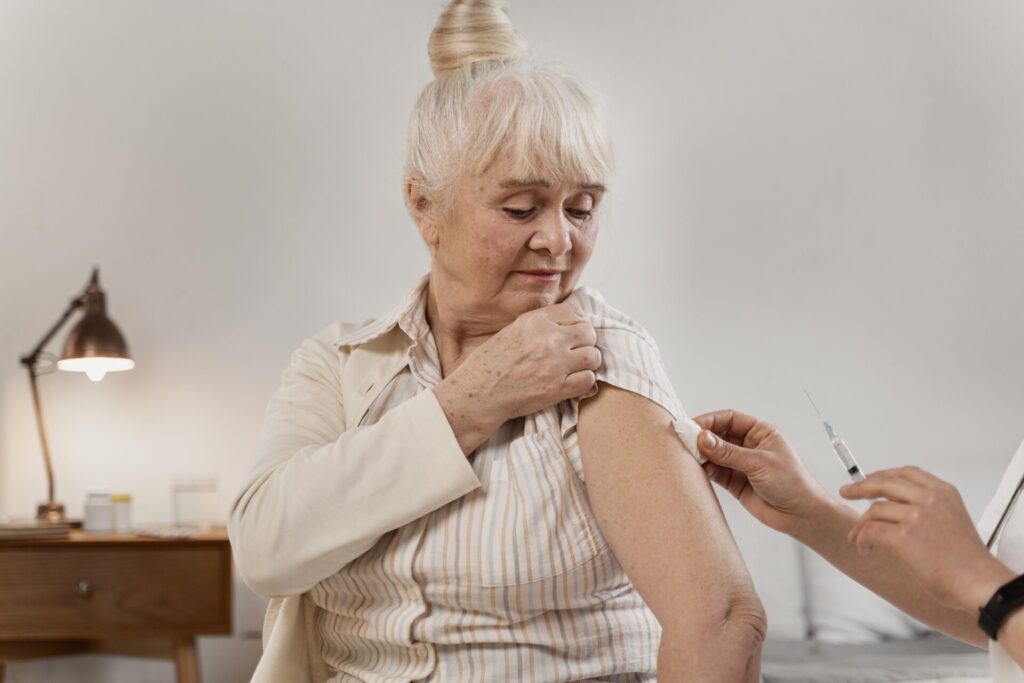As the crisp morning air settles over Somerset West this June, we know winter has officially arrived. It’s 11:10 AM on Friday, June 20, 2025, and the Helderberg mountains are starting to don their misty caps, while the golden hues of Strand Beach give way to cooler, wetter days. At Helderberg Family Practice, Dr. Deidré Reed and Dr. Rinky Vamvadelis are gearing up to support our community through this season of change. Winter brings cozy blankets, hot tea, and perhaps a few extra layers, but it also ushers in flu season—a time when sniffles and coughs become all too common. Let’s explore what winter means for Somerset West, why flu is a concern, what the flu vaccine is all about, how it helps, which strains are most prevalent, and why the elderly are especially vulnerable. With a little knowledge and care, we can all stay well this winter!
Welcoming Winter in Somerset West
Winter in Somerset West is a beautiful yet challenging season. Starting in June, the days grow shorter, temperatures dip (averaging 7–17°C according to local climate data), and rain becomes a frequent visitor, often transforming the Helderberg Nature Reserve into a lush green haven. While we might trade beach days for indoor family time at places like Vergelegen Estate, this season also brings a cozy charm—think crackling fireplaces and warm soups made from local produce. But with the cooler weather comes a higher risk of respiratory illnesses, especially flu, which tends to peak between June and September in the Southern Hemisphere.

This shift isn’t just about the weather; it affects our health too. Indoor crowding during rainy days, drier air from heaters, and less sunlight (reducing vitamin D levels) can weaken our immune systems, making us more susceptible to viruses. At Helderberg Family Practice, we see an uptick in patients with colds and flu as winter sets in, prompting us to focus on prevention and education. Understanding these seasonal changes helps us prepare, ensuring our community stays healthy and happy through the colder months.
What Is the Flu, and Why Does It Thrive in Winter?
Flu, short for influenza, is a contagious respiratory illness caused by influenza viruses. Unlike the common cold, which builds up gradually with a stuffy nose or sore throat, flu hits fast with symptoms like fever, chills, muscle aches, fatigue, and a dry cough. Most people recover within a week or two, but for some, it can lead to serious complications like pneumonia or worsening chronic conditions.

So why does flu season kick off in winter? One theory is that cold, dry air helps the virus survive longer outside the body, making it easier to spread through droplets when people cough or sneeze. Indoor gatherings during rainy Somerset West days also increase transmission. Another factor is that our immune defenses might dip in winter due to less sunlight exposure, leaving us more vulnerable. Whatever the reason, flu becomes a seasonal visitor, and in 2024, South Africa reported a notable rise in cases by mid-June, according to health authorities, signaling an active season ahead.
What Is the Flu Vaccine, and How Does It Work?
The flu vaccine is your best ally against this seasonal threat. It’s an annual shot or nasal spray designed to protect against the most likely flu strains for the upcoming season. Each year, experts from the World Health Organization (WHO) analyze global virus patterns to predict which strains—like influenza A (H1N1, H3N2) or influenza B (Victoria, Yamagata)—will dominate. The 2025 vaccine, available from April in the Southern Hemisphere, will be a trivalent or quadrivalent formula, covering three or four strains based on these predictions.

The vaccine works by introducing inactivated or weakened virus parts into your body. This triggers your immune system to produce antibodies, which remember how to fight those specific strains. It takes about two weeks for full protection to kick in, so getting vaccinated early—ideally in April or May—is key. The vaccine doesn’t guarantee you won’t get flu (its effectiveness varies from 40-60% depending on the match with circulating strains), but it reduces severity, shortens illness duration, and lowers the risk of complications like hospitalization.
At Helderberg Family Practice, we offer the flu vaccine to eligible groups, including those over 65, pregnant women, and people with chronic conditions. It’s a quick, safe process—usually a jab in the arm—and side effects like a sore arm or mild fatigue fade within a day or two. If you’re unsure about eligibility, give us a call or check with your local pharmacy.
The Most Common Flu Strains This Winter
Flu strains change yearly, but based on recent patterns, influenza A (H1N1 and H3N2) and influenza B (Victoria or Yamagata lineages) are the usual suspects. H1N1, linked to the 2009 pandemic, often affects younger people and can cause moderate to severe illness. H3N2 tends to hit the elderly harder, leading to more hospitalizations, while influenza B, though less severe, still causes significant discomfort. In 2024, South African health data indicated a rise in H3N2 cases by mid-year, suggesting it might dominate this winter.
These strains mutate quickly, which is why the vaccine is updated annually. Even if it’s not a perfect match, it offers partial protection, reducing the virus’s impact. Knowing which strains are circulating helps us tailor advice—H3N2’s severity for the elderly, for instance, underscores the need for vaccination in that group. Keep an eye on local health updates, and we’ll keep you informed through our blog as the season progresses.
The Danger of Flu for the Elderly
Flu can be unpleasant for anyone, but it’s especially dangerous for the elderly, particularly those over 65. In South Africa, where winters can strain older adults with conditions like diabetes or heart disease, flu complications are a real concern. The virus can lead to pneumonia, bronchitis, or worsen existing health issues, sometimes resulting in hospitalization or death. Globally, the World Health Organization estimates 290,000–650,000 flu-related deaths annually, with a significant portion among the elderly.
Why are older adults so vulnerable? Aging weakens the immune system, reducing its ability to fight infections effectively. Chronic conditions, common in this age group, further complicate recovery. In Somerset West, where many enjoy an active retirement—perhaps gardening at home or walking along the Lourens River—this vulnerability can catch people off guard. Data from the UK (adjusted for Southern Hemisphere trends) shows flu vaccines reduce hospitalization risk by about 40-60% in the elderly, a statistic we see reflected in our practice’s outcomes.

At Helderberg Family Practice, we prioritize elderly care, offering flu vaccines and regular check-ups to monitor health. If you care for an elderly relative, encourage them to get vaccinated and watch for symptoms like persistent fever or shortness of breath, which warrant a call to us or 10177 for emergency advice.
Staying Healthy This Winter in Somerset West
Winter wellness in Somerset West means staying proactive. Here are some tips from Dr. Deidré Reed and Dr. Rinky Vamvadelis:
- Get Vaccinated: Book your flu shot early to build immunity before the peak (June–September).
- Boost Immunity: Eat nutrient-rich foods like citrus fruits, leafy greens, and local seafood, and ensure adequate rest.
- Stay Warm: Keep your home at least 18°C, especially for the elderly, to avoid colds or flu exacerbation.
- Hygiene Matters: Wash hands frequently and avoid touching your face to reduce virus spread.
- Monitor Symptoms: Seek medical advice if you experience severe symptoms, especially for older adults.
Community support is key too. Check on neighbors, share health tips at local gatherings, or join us for flu vaccine clinics when announced. Our proximity to Vergelegen Hospital ensures quick referrals if needed, but prevention starts with you.
Why Flu Prevention Matters to Us
At Helderberg Family Practice, we see flu season as a chance to strengthen our community’s health. Dr. Deidré Reed and Dr. Rinky Vamvadelis are passionate about keeping Somerset West residents well, from young families to our elders. The flu vaccine isn’t just about you—it protects those around you, breaking the chain of transmission in our close-knit area. With winter settling in, now’s the time to act.
Ready to stay healthy this season? Book with us to discuss the flu vaccine or your winter health plan. Let’s make this winter in Somerset West a season of wellness, not worry!

